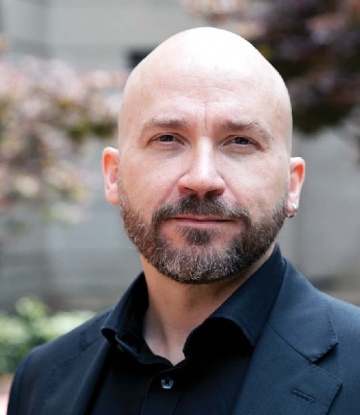Columbia College | Columbia University in the City of New York
Creating a Third Space

Core Curriculum director Larry Jackson
EMMA ASHER
Near them, on College Walk, a smaller group of counter-protestors waved their flags and used a bullhorn to drown out the chants of their opponents.
I sat at a Listening Table on Butler Plaza talking quietly with a group of 30 or 40 people — mostly students, some faculty. We had no bullhorns or flags. Our opinions and identities were diverse.
There was the student who spent a gap year in Jerusalem and spoke about her Israeli friends, some now serving in the IDF, others peaceniks marching in the streets of Tel Aviv.
The German exchange student who spoke of his horror at seeing images of civilian deaths in Gaza, and his disgust with antisemitic rhetoric.
The graduate student who believed in free speech, but admitted that it was hard for him to listen to his Arab-American girlfriend’s opinions about the Israeli- Palestinian conflict, which differed from his own.
We shared our stories, opinions and feelings; mostly, we listened.

Since that day in September, Columbia’s Trust Collaboratory has organized more than a dozen of these Listening Tables in public spaces around campus, drawing hundreds of students, faculty, staff and alumni to talk about war, protest and the recent election.
The Center for the Core Curriculum has helped staff and promote these tables, and we are now working with The Trust Collaboratory to establish a program that will train students currently enrolled in Literature Humanities and Contemporary Civilization to facilitate these difficult dialogues. It is just one of the ways we are responding to the conflicts and divisions on campus.
We also launched the Deans’ Practices in Community Building Fellowship, in which 25 undergraduates with diverse backgrounds and perspectives are developing projects that will bring people on campus together through service, the arts and dialogue, while reflecting on the ideas that they encounter in Core texts.
In Core classes, students contend with a range of experiences and perspectives in works of literature, philosophy, art and music that address the very issues that are now dividing us: war, injustice, bigotry, revenge. These works and the discussions they prompt provide occasions for students to listen, question long-held assumptions and reconsider entrenched opinions. Sometimes a text or another person’s insight spurs students to revise their thinking; at other times, students discover ideas that deepen their convictions. This is what thinking looks like.
The Core, like democracy itself, rests on the premise that people will always disagree, but that we can, through practice, learn to disagree better and use our differences productively.
Yet, when students step outside the classroom, they enter toxic, polarized spaces that have lost faith in productive disagreement. Online anonymity and algorithms create echo chambers that reward extreme views, ugly prejudices and vitriolic rhetoric. Hyperbolic accusations, violent threats and calumny are common, where once they may have been condemned.
If we are to find a way out of this situation, it will require a different kind of public conversation, one that allows us to exchange diverse perspectives. It will require us to embrace public disagreement rather than ideological purity. It will mean abandoning simplistic talking points and tidy narratives so we can think out loud together.
In short, it will mean taking what we do in Core classes into our public spaces with projects like the Listening Tables and the community-building practices that 25 student fellows are now developing. If we are successful, these projects will create a third space between the classroom with its norms and the unruly political arenas where partisan conflict has replaced productive disagreement.
A week or two before participating in my first Listening Table, I was discussing Plato’s Republic with my students in Contemporary Civilization. The text opens with Socrates making his way back to Athens when a group of men force him to stop. Rather than strongarm his way past them, Socrates tries to persuade them to let him go on.
The long journey of ideas that students embark on in Contemporary Civilization begins with a choice between force and persuasion. Students have long practiced persuasion in the Core. Now we are helping them emulate Socrates’ choice outside the classroom.
Issue Contents
Published three times a year by Columbia College for alumni, students, faculty, parents and friends.
Columbia Alumni Center
622 W. 113th St., MC 4530, 6th Fl.
New York, NY 10025
212-851-7852
cct@columbia.edu
Columbia Alumni Center
622 W. 113th St., MC 4530, 4th Fl.
New York, NY 10025
212-851-7488
ccalumni@columbia.edu

